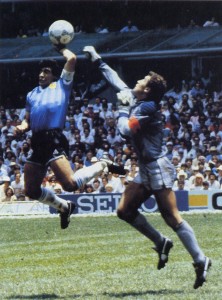Malvinas Day & Maradona’s Revenge
[Tom talks history…and World Cup fútbol highlights on YouTube.]
It may not feel like a holiday in the US, but, in Argentina, today is Malvinas Day. Schools are out, banks are closed, and all of Argentina honors the 649 fallen soldiers who died 27 years ago in what the English-speaking world calls the Falkland Islands War, but is referred to here as la Guerra de las Malvinas.
The girls didn’t know anything about the war, so it was off to the Internet to cover some of the basics for a special worldschool lesson. The question we studied was “If the islands are so close to Argentina and so far from Great Britain, why do they belong to the British? (It’s complicated. Both countries have claimed sovereignty over the islands since the early 1800s.) What language do the islanders speak? (English.) Why did the Argentine military junta leaders attack the islands after decades of stalled negotiations? (They were trying to boost their flagging popularity.)
Ironically, the invasion of the Falkland Islands led to the end of military junta rule in Argentina and ushered in the return of democracy. However, Argentines still strongly believe in their sovereignty over las Islas Malvinas and continue to press for their return.
In addition to covering some political history, Malvinas Day also gave me a great opportunity to pull up a couple of YouTube videos and fill the girls in on another important figure in Argentina history:
Diego Maradona.
Greatest Argentine fútbol player ever. A larger-than-life figure who has had his share of larger-than-life problems, but who has battled back, and is now the head coach of the Argentina national team.
But, what does Diego Maradona have to do with Malvinas Day?
Well, I hadn’t realized it until recently, but two of Maradona’s most legendary goals occurred in a 1986 World Cup quarterfinal match against England. Just four years after England defeated Argentina in la Guerra de las Malvinas, Maradona achieved a bit of revenge.
In fact, these two goals are so famous, they are referred to by name.
First, “The Hand of God” goal.
It’s hard to tell from the video, but as the photo at the top of this post makes perfectly clear, Maradona’s goal was the result of an uncalled handball. After the game, Maradona explained that the the goal was scored “a little with the head of Maradona and a little with the hand of God.”
My daughters didn’t really buy his poetic explanation. “But, that’s cheating!” they protested.
Next, just four minutes later, “The Goal of the Century.” No assistance from Dios on this one–just pure Maradona magic.

[…] the funeral procession of former President Raul Alfonsín . After the procession many … Malvinas Day & Maradona’s Revenge[micheleandtom.com] It may not feel like a holiday in the US, but, in Argentina, today is Malvinas […]
I’m baffled. Malvinas Day, under one name or another, has been happening in Argentina for more or less 27 years yet _this_ April 2nd Argentina gave a state funeral to the ex-president whose election ushered civilian government back into this country and arguably lead the way to the civilianisation of the rest of South America yet this doesn’t get a mention.
It’s true that Raúl AlfonsÃn was, by nearly all accounts, a remarkable leader, and that the three days of national mourning for him was a significant story here in Argentina.
However, I’m baffled by your bafflement. If you’ve read any of the other posts on this blog, you’ve probably noticed that Michele and I don’t really pretend to cover the most important news stories in Argentina. Malvinas Day may not be new to Argentina, or new to you, but it was new to my girls, and I thought it was an interesting topic to discuss.
Writing about AlfonsÃn would have made for a fascinating post, I’m sure, but it would have been almost completely unrelated to the one I did write. And, really, how would I have worked Maradona highlights from YouTube into that post?
No, no, I take your point about the way you are recording life as you see it, etc. My point is that just about everybody I know was focussed on Alfonsin on Thursday – whether standing out in the crowds or watching on TV. And since his story is inextricably linked to that of the Malvinas, I’m amazed that he didn’t get a mention
Nick,
Fair enough. Perhaps as a relatively recent expat, I don’t always appreciate the full significance of local events. You’ll be happy to know that, in part inspired by your comments, I did do some reading up, and now know much more about AlfonsÃn than I did just a few days ago!